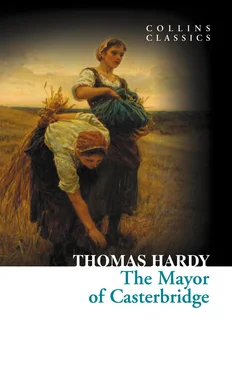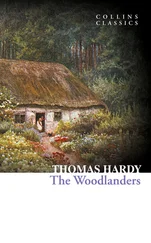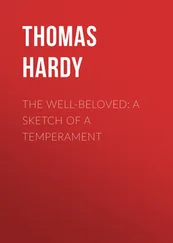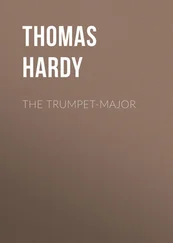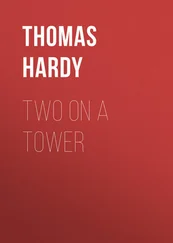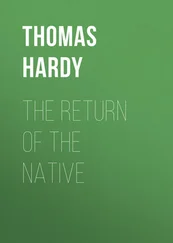A general sense of regret, in which Elizabeth-Jane shared not least, made itself apparent in the company. As she looked at Farfrae from the back of the settle she decided that his statements showed him to be no less thoughtful than his fascinating melodies revealed him to be cordial and impassioned. She admired the serious light in which he looked at serious things. He had seen no jest in ambiguities and roguery, as the Casterbridge toss-pots had done; and rightly not—there was none. She disliked those wretched humours of Christopher Coney and his tribe; and he did not appreciate them. He seemed to feel exactly as she felt about life and its surroundings—that they were a tragical rather than a comical thing; that though one could be gay on occasion, moments of gaiety were interludes, and no part of the actual drama. It was extraordinary how similar their views were.
Though it was still early the young Scotchman expressed his wish to retire, whereupon the landlady whispered to Elizabeth to run upstairs and turn down his bed. She took a candlestick and proceeded on her mission, which was the act of a few moments only. When, candle in hand, she reached the top of the stairs on her way down again, Mr Farfrae was at the foot coming up. She could not very well retreat; they met and passed in the turn of the staircase.
She must have appeared interesting in some way—notwithstanding her plain dress—or rather, possibly, in consequence of it, for she was a girl characterized by earnestness and soberness of mien, with which simple drapery accorded well. Her face flushed, too, at the slight awkwardness of the meeting, and she passed him with her eyes bent on the candle-flame that she carried just below her nose. Thus it happened that when confronting her he smiled; and then, with the manner of a temporarily light-hearted man, who has started himself on a flight of song whose momentum he cannot readily check, he softly tuned an old ditty that she seemed to suggest—
‘As I came in by my bower door,
As day was waxin’ wearie,
Oh wha came tripping down the stair
But bonnie Peg my dearie.’
Elizabeth-Jane, rather disconcerted, hastened on; and the Scotchman’s voice died away, humming more of the same within the closed door of his room.
Here the scene and sentiment ended for the present. When, soon after, the girl rejoined her mother, the latter was still in thought—on quite another matter than a young man’s song.
‘We’ve made a mistake,’ she whispered (that the Scotchman might not overhear). ‘On no account ought ye to have helped serve here tonight. Not because of ourselves, but for the sake of him . If he should befriend us, and take us up, and then find out what you did when staying here, ’twould grieve and wound his natural pride as Mayor of the town.’
Elizabeth, who would perhaps have been more alarmed at this than her mother had she known the real relationship, was not much disturbed about it as things stood. Her ‘he’ was another man than her poor mother’s. ‘For myself,’ she said, ‘I didn’t at all mind waiting a little upon him. He’s so respectable, and educated—far above the rest of ’em in the inn. They thought him very simple not to know their grim broad way of talking about themselves here. But of course he didn’t know—he was too refined in his mind to know such things!’ Thus she earnestly pleaded.
Meanwhile, the ‘he’ of her mother was not so far away as even they thought. After leaving the Three Mariners he had sauntered up and down the empty High Street, passing and repassing the inn in his promenade. When the Scotchman sang his voice had reached Henchard’s ears through the heart-shaped holes in the window-shuters, and had led him to pause outside them a long while.
To be sure, to be sure, how that fellow does draw me!’ he had said to himself. ‘I suppose ’tis because I’m so lonely. I’d have given him a third share in the business to have stayed!’
When Elizabeth-Jane opened the hinged casement next morning the mellow air brought in the feel of imminent autumn almost as distinctly as if she had been in the remotest hamlet. Casterbridge was the complement of the rural life around; not its urban opposite. Bees and butterflies in the cornfields at the top of the town, who desired to get to the meads at the bottom, took no circuitous course, but flew straight down High Street without any apparent consciousness that they were traversing strange latitudes. And in autumn airy spheres of thistledown floated into the same street, lodged upon the shop fronts, blew into drains, and innumerable tawny and yellow leaves skimmed along the pavement, and stole through people’s doorways into their passages with a hesitating scratch on the floor, like the skirts of timid visitors.
Hearing voices, one of which was close at hand, she withdrew her head and glanced from behind the window-curtains. Mr Henchard—now habited no longer as a great personage, but as a thriving man of business—was pausing on his way up the middle of the street, and the Scotchman was looking from the window adjoining her own. Henchard, it appeared, had gone a little way past the inn before he had noticed his acquaintance of the previous evening. He came back a few steps, Donald Farfrae opening the window further.
‘And you are off soon, I suppose?’ said Henchard upwards.
‘Yes—almost this moment, sir,’ said the other. ‘Maybe I’ll walk on till the coach makes up on me.’
‘Which way?’
‘The way ye are going.’
‘Then shall we walk together to the top o’ town?’
‘If ye’ll wait a minute,’ said the Scotchman. In a few minutes the latter emerged, bag in hand. Henchard looked at the bag as at an enemy. It showed there was no mistake about the young man’s departure. ‘Ah, my lad,’ he said, ‘you should have been a wise man, and have stayed with me.’
‘Yes, yes—it might have been wiser,’ said Donald, looking microscopically at the houses that were furthest off. ‘It is only telling ye the truth when I say my plans are vague.’
They had by this time passed on from the precincts of the inn, and Elizabeth-Jane heard no more. She saw that they continued in conversation, Henchard turning to the other occasionally, and emphasizing some remark with a gesture. Thus they passed the King’s Arms Hotel, the Market House, St Peter’s churchyard wall, ascending to the upper end of the long street till they were small as two grains of corn; when they bent suddenly to the right into the Bristol Road, and were out of view.
‘He was a good man—and he’s gone,’ she said to herself. ‘I was nothing to him, and there was no reason why he should have wished me good-bye.’
The simple thought, with its latent sense of slight, had moulded itself out of the following little fact: when the Scotchman came out at the door he had by accident glanced up at her; and then he had looked away again without nodding, or smiling, or saying a word.
‘You are still thinking, mother,’ she said, when she turned inwards.
‘Yes; I am thinking of Mr Henchard’s sudden liking for that young man. He was always so. Now, surely, if he takes so warmly to people who are not related to him at all, may he not take as warmly to his own kin?’
While they debated this question a procession of five large waggons went past, laden with hay up to the bedroom windows. They came in from the country, and the steaming horses had probably been travelling a great part of the night. To the shaft of each hung a little board, on which was painted in white letters, ‘Henchard, cornfactor and hay-merchant’. The spectacle renewed his wife’s conviction that, for her daughter’s sake, she should strain a point to rejoin him.
The discussion was continued during breakfast, and the end of it was that Mrs Henchard decided, for good or for ill, to send Elizabeth-Jane with a message to Henchard, to the effect that his relative Susan, a sailor’s widow, was in the town; leaving it to him to say whether or not he would recognize her. What had brought her to this determination were chiefly two things. He had been described as a lonely widower; and he had expressed shame for a past transaction of his life. There was promise in both.
Читать дальше
